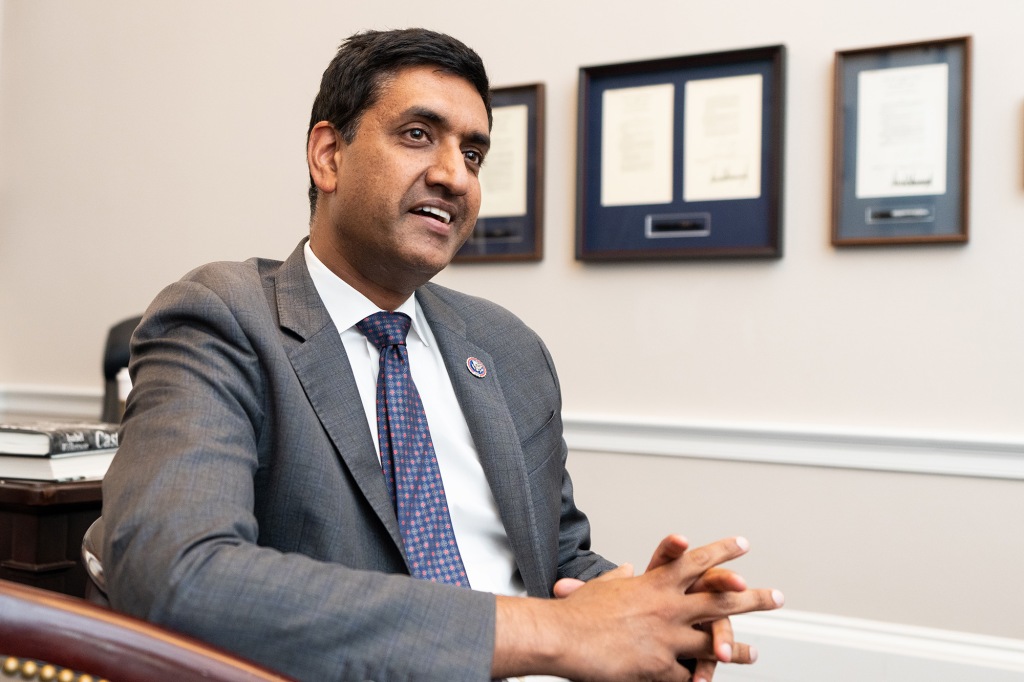When Twitter tried to smother distribution of an October 2020 New York Post exposé of Joe Biden’s son, Hunter, just weeks before the presidential election, Republicans cried foul.
Thanks to new owner Elon Musk’s big reveal Friday of internal communications showing how it all went down, we now know one Bay Area Democrat privately echoed the GOP’s free-speech concerns to the San Francisco social media giant’s decision-makers: Rep. Ro Khanna.
The unexpected revelation came at some discomfort to Khanna — Musk’s disclosure included the congressman’s private email, which he learned after more than 200 emails poured into his inbox over the weekend. Some of those missives were supportive, others not so much, requiring him to change his security settings. But Khanna has no hard feelings or regrets.
“I’m for transparency,” Khanna said in an interview Monday evening. “I’ve always been a very robust defender of the First Amendment.”
The free-speech flap erupted over an Oct. 14, 2020, New York Post story based on files copied from what appeared to be Hunter Biden’s laptop computer that was abandoned at a repair shop. The files were shared with the Post by former New York Mayor Rudy Giuliani..
The Post reported that emails recovered from the computer showed that when Joe Biden was vice president and his son a paid board member at a Ukrainian energy firm, Hunter Biden sought his father’s help getting Ukrainian authorities to stop investigating the company.
Twitter initially removed links to the online article — published less than three weeks before the 2020 presidential election — and included warnings about it, citing concerns that emails on which the article was based may have been hacked and contained private information in violation of its policies.
Twitter’s then-chief executive, Jack Dorsey, expressed concerns about how the decision was communicated, and within days the company reversed course and allowed the links to the article. Biden went on to win the election.
Musk, the world’s richest man who heads electric car maker Tesla and SpaceX, bought Twitter months ago, saying he wanted to balance content moderation that Republicans have long complained was tilted against them.
On Friday he promised to show “what really happened with the Hunter Biden story suppression by Twitter” and shared links to a tweet thread by independent journalist Matt Taibbi of highlights from what he said were “thousands of internal documents obtained by sources at Twitter.”
Those tweets revealed a robust internal debate over removing the New York Post exposé, with one Twitter official emailing, “I’m struggling to understand the policy basis for marking this as unsafe,” and another urging they move cautiously with “an emerging situation where the facts remain unclear.”
In an Oct. 14, 2020, personal email to a Twitter lawyer who reviewed decisions over content flagged for harassment or misinformation, Khanna wrote that the move was “generating huge backlash” on Capitol Hill, where Republican lawmakers were threatening to revisit Section 230. That’s the part of the Communications and Decency Act that protects social media from liability for third-party content posted on their platforms.
After the lawyer explained the potential policy violation, Khanna responded that “this seems a violation of the First Amendment principles” but urged her to “keep this communication between just us and Jack.”
“I say this as a total Biden partisan and convinced he didn’t do anything wrong,” Khanna went on. “But the story now has become more about censorship than relatively innocuous emails and it’s become a bigger deal than it would have been … In the heat of a Presidential campaign, restricting dissemination of newspaper articles (even if the NY Post is far right) seems like it will invite more backlash than it will do good.”
Khanna made similar remarks publicly, too.
David Loy, legal director for the First Amendment Coalition, notes that Twitter’s suppression of the story didn’t actually run afoul of the constitution’s free speech rights, which only restrict government censorship. As a private company, Twitter is free to decide what content to allow on its platform. And both the Biden campaign, which wasn’t a government agency, and the Trump White House were free to make content suggestions.
Taibbi tweeted Friday that the initial decision to block the Post story was made without Dorsey’s input and that “Khanna was the only Democratic official I could find in the files who expressed concern” about it.
David McCuan, who chairs the political science department at Sonoma State University, said Khanna, just elected to a fourth term representing the 17th Congressional District stretching from his Fremont home down through Santa Clara and Cupertino, is something of a Democratic maverick.
“He has shown an independent streak and pugnaciousness,” McCuan said, “pushing back on the Democratic party.”
Khanna, a married father of two who earned a law degree at Yale, worked on Barack Obama’s Illinois state senate campaign and later in his presidential administration. He ruffled some feathers among local Democrats when he challenged Rep. Mike Honda’s re-election, defeating him in 2016. He bills himself as “a leading progressive voice in the House working to democratize the digital economy” and co-chaired Vermont Sen. Bernie Sanders’ 2020 presidential bid.
But McCuan said while Khanna, who has been suggested as a presidential contender, pushes his party on progressive ideals such as Medicare for all and tuition-free college, he also has a pragmatic side, “moving forward on simple progressive ideas, with a nod to realpolitik.”
On technology-industry regulation, Khanna has noted both Democrats and Republicans are frustrated with social media moderation — Democrats want more of it to muzzle hate speech and disinformation, while Republicans want it dialed back to be less subjective and — as they see it — biased against conservatives.
Khanna said he likes a lot of what Musk has done since taking over Twitter but that “it’s still a work in progress.” He notes content moderation is needed, but he said a “bipartisan group of First Amendment scholars” should recommend clear, uniform standards.
“These are modern public squares,” Khanna said. “We should have wide open robust debate.”









